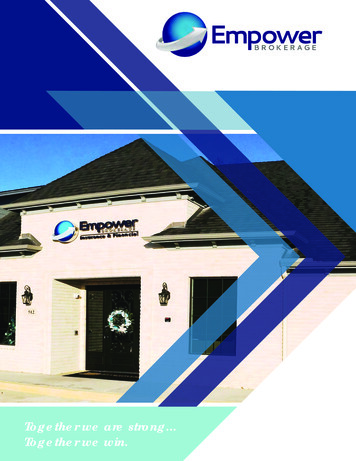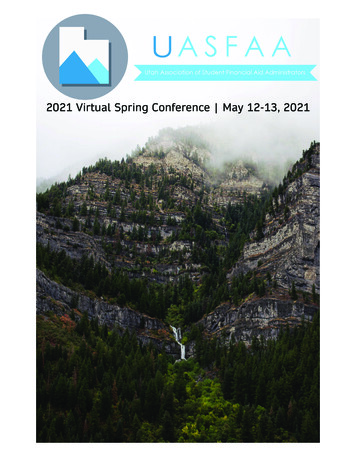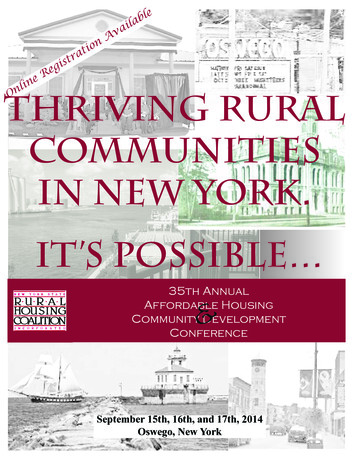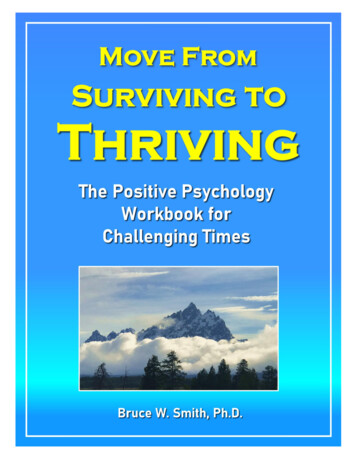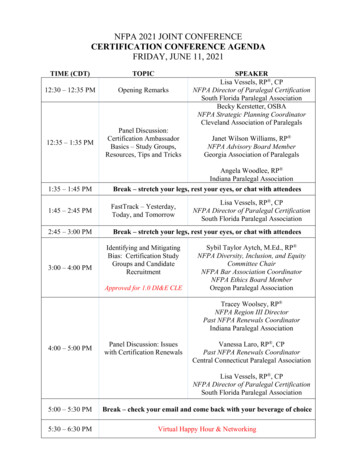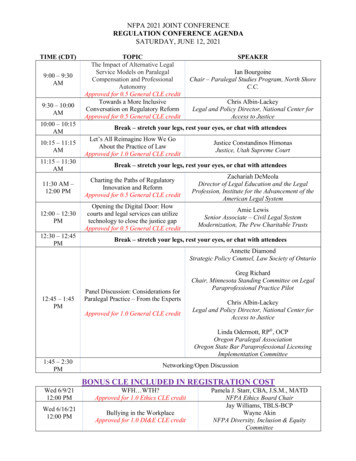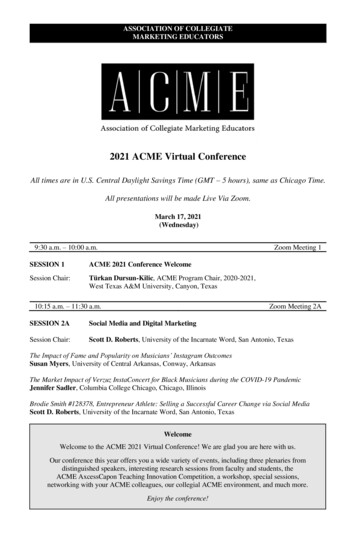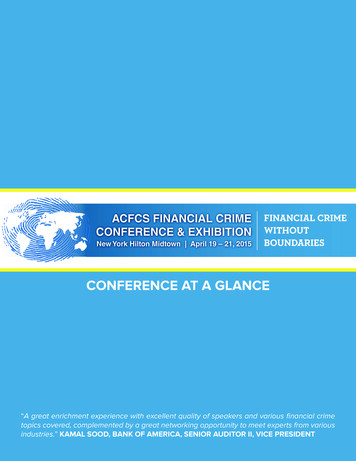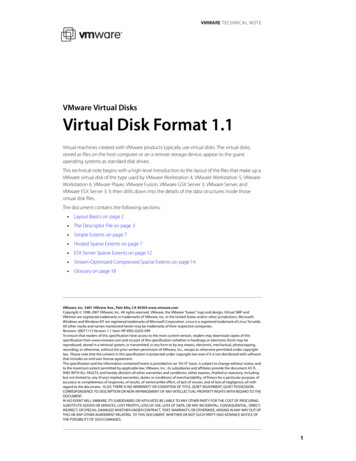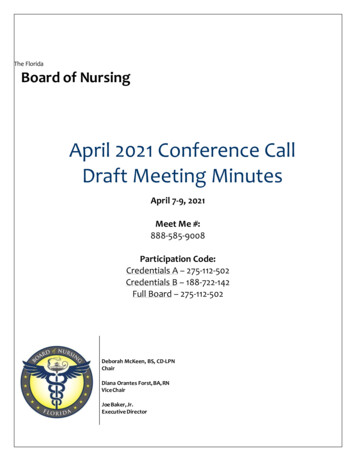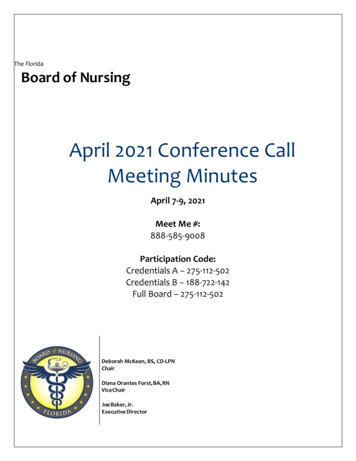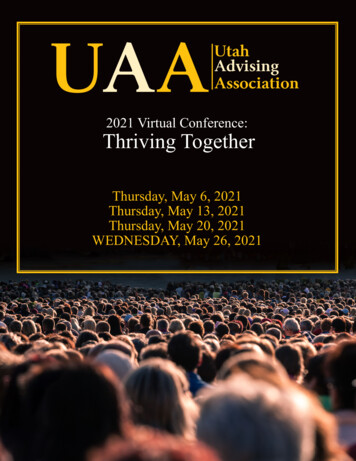
Transcription
2021 Virtual Conference:Thriving TogetherThursday, May 6, 2021Thursday, May 13, 2021Thursday, May 20, 2021WEDNESDAY, May 26, 2021
Dear Conference Attendees:On behalf of the Utah Advising Association (UAA) Executive Committeeand Governing Board, I would like to welcome you to the 20th AnnualUAA Conference! We were saddened to cancel our conference last year,but we are excited to move forward with our 2021 virtual conference. Ithas been my pleasure to work with the dedicated representatives fromeach of the 12 major colleges and universities in the state of Utah and areexcited that so many of you are participating in UAA’s first virtualconference.This academic year has certainly challenged all of us and created newopportunities for growth. With this challenging year, we have chosen thetheme of “Thriving Together” because we have found new ways to engagestudents, overcome challenges and obstacles, and continue to find ways tothrive. We have witnessed students facing enormous challenges this yearbut despite the setbacks we have pressed forward to help them achievetheir goals. We hope this conference will help you develop new tools andskills that you may not be able to gain at your home institution.We would like to thank those who submitted presentation proposals. Weare confident all of the presentations, as well as this year’s keynotespeakers, will benefit you in many ways. I am grateful of the presenterswho spent the hours preparing to teach us, of the Advisor of the Yearnominees who submitted their portfolios, and everyone that isparticipating to make this a great conference! It is our hope that you willenjoy UAA’s first virtual conference.Daniel JensenWeber State University2020-2021 Utah Advising Association PresidentPage 1
2021UAA 2021 Conference ProgramLetter from the 2020-21 UAA President . 1History of the Utah Advising Association . 3UAA Mission Statement. 3Past and Present Presidents of UAA . 3UAA 2020-21 Governing Board . 4UAA 2021 Conference at a Glance . 5Program Schedule:Thursday, May 6, 2021Keynote Speaker Biography (Dr. David Schramm).7Breakout Sessions . 8Thursday, May 13, 2021Breakout Session 1 . 9Breakout Session 2 .10Thursday, May 20, 2021Breakout Session 1 . 11Breakout Session 2 . 12WEDNESDAY, May 26, 2021Breakout Session 1 . 13Keynote Speaker Biography (Dr. Mitchell Colver) . 14Notes . 15Page 2
History of the Utah Advising AssociationThe Utah Advising Association traces its origin back more than 30 years to what was known asthe Utah Advising Conference. In the beginning, there were several advising administrators throughoutthe state that thought it would be nice to gather the advisors together from their institutions for aconference to discuss advising-related issues and network with each other.Over time, this informal conference grew to include new student orientation and became a greattradition among Utah advising and orientation professionals who looked forward to gathering each yearin Park City at the Yarrow Hotel. As the number of advisors grew throughout Utah and as nearly all ofthe original conference organizers had moved on, it became clear that something must be done tomaintain this great tradition.On September 30, 1999, those serving on the conference committee voted to officially organizethe Utah Advising and Orientation Association (UAOA) and a set of bylaws were adopted that wouldensure that the opportunities for advisors in Utah would continue. Due to evolving structures among themajority of Utah higher education institutions, the UAOA governing committee voted on September 27,2013, to remove Orientation from the name of the organization to more accurately reflect those whoparticipate. Advising in Utah has never been stronger, and it is through the strength and organization ofthe Utah Advising Association (UAA) that Utah has not only maintained a valuable advising tradition,but has also hosted acclaimed regional and national conferences for the National Academic AdvisingAssociation.The key to success for the UAA has always been in the wonderful advisors located at the Collegesand Universities throughout the state. The knowledge and experience shared among these colleagueshas truly been amazing and is sure to continue indefinitely as we gather together each year.MissionThe mission of the Utah Advising Association (UAA) is to provide professional developmentopportunities for college and university personnel who serve as a part of the academic advisingcommunity. The UAA also serves as a vehicle to promote collaboration between representatives ofinstitutions throughout the state of Utah.Presidents of the UAA2019-2021Daniel Jensen, Weber State University2018-2019Cara Wiley, Brigham Young University2016-2017Mayumi Kasai, University of Utah2015-2016Camille Gooch, Weber State University2014-2015Katya Konkle, Southern Utah University2013-2014Gale Larson, Brigham Young University2012-2013Vicky Larsen, Utah State University2011-2012Jennifer Wright, Weber State University2010-2011Clint Moser, Utah Valley University2009-2010Shanny Wilson, College of Eastern Utah1999-2009See www.utahadvising.org for complete listPage 3
2021UAA 2020-2021 Governing BoardPresidentDaniel JensenWeber State UniversityAssociate Director, Starfish Early Alertdanieljensen3@weber.eduPast PresidentCara WileyBrigham Young UniversitySupervisor, Nursing Advisement Centercara wiley@byu.eduSecretary (non-voting)Kim TruesdellUtah Valley UniversityAdministrative Support, Office of University Advisingkimt@uvu.eduUVU Administrative Representative (non-voting)Clint MoserUtah Valley UniversityAdvisement Technology Coordinatorclint.moser@uvu.eduBoard MembersStephanie BegayeUniversity of UtahAcademic Advising CoordinatorSBegaye@advising.utah.eduMike OlsonDixie State UniversityDirector, Academic Advisementolson@dixie.eduTyler MorganStudent Success AdvisorEnsign Collegetmorgan@ensign.eduSylvia PeraltaAcademic AdvisorSalt Lake Community Collegesylvia.peralta@slcc.eduKelly SchoppeSnow CollegeAcademic Advisor-Health Professions/UndecidedKelly.schoppe@snow.eduCraig LewisStudent Success AdvisorSouthern Utah Universitycraiglewis@suu.eduErin BergeronSenior Academic AdvisorUtah State Universityerin.bergeron@usu.eduLiz PrettymanUtah State University EasternAcademic Advising Coordinatorliz.prettyman@usu.eduKim WrightAcademic Advisor IIwrightki@uvu.eduUtah Valley UniversityFrances PeacockWestminster CollegeAssistant Director, Student Success and RetentionPage 4fpeacock@westminstercollege.edu
THURSDAY, MAY 6, 202112:00-12:10 PM : Welcome & Announcements: Daniel Jensen, 2020-2021 President12:10-1:00 PM: Keynote Address: Dr. David Schramm, Utah State UniversityBREAKOUT SESSION ONE (1:10-2:00 PM)PRESENTER(S)SCHOOLTITLE (CODES)Mykel BeorchiaJulia VincentCamille GoochUSUU of UWSUModeling Care for Students: Creating a Culture of People Before Process(T, P)Marilyn RichardsCarol StepanVika FilimoeatuBYUMaking Connections in an Ever-Changing Environment (B, T, M)Lisa PackardSLCCUnderstanding and Embracing Our Own Emotional Self-Care (P, I)Elaine LewisKari GaryUVUAdvising as Art & Science: Adopting an Analytics Platform (B, P)THURSDAY, MAY 13, 2021– BREAKOUT SESSION ONE (12:00-12:50 PM)PRESENTER(S)Julie PreeceScott HosfordLa Nae ValantineSCHOOLTITLE (CODES)BYUSick and Tired– Best Practices for Advising Students with Chronic Pain andIllness (B, P)Katie BernardColleen GilmanU of UApplying Positive Psychology in Advising: Discovering & Implementing theHappiness Advantage (B, T, P, I)Anneli ByrdWSUUnsticking the Developmental Math Student (T)Annette PetersenUSUThe Science of Resiliency (B, T, P)BREAKOUT SESSION TWO (1:00 PM-1:50 PM)PRESENTER(S)Emily HowsleyJiabao GaoSCHOOLU of UTITLE (CODES)“I’m Not That Kind of Guy”: Reframing Mental Health Services for MaleStudents (B, T, M)Zac OlsonDSUGoing to College During a Pandemic: A Student Perspective (T, P)Rachel TerryBecca WeidnerEmily EmerickUVUBYUBYUThe First Five Minutes: Connecting with Students Quickly (B, P, M, I)Ashley HoltChristy HoffmannUVUThe Do’s and Don’ts of Intercultural Communication (B, P)Best PracticesTheory-basedPersonal DevelopmentPage 5Advising ModelsInteractive
2021THURSDAY, MAY 20, 2021– BREAKOUT SESSION ONE (12:00-12:50 PM)PRESENTER(S)Amy SotoCara WileyAshley MendozaSCHOOLBYUTITLE (CODES)Recapturing a Part of Yourself: Overcoming Empathy Fatigue (P, I))Morgan SriphongNgarmU of UBuilding Belonging for your Students: Steps you can Take to Develop aLearning Community (B)Chandler WhitlockDeborah DeckerDSUGet Onboard! Promoting Early Advisor-Student Interaction (B, I)Elaine LewisAlison JensenUVUBingo! Mastering Virtual Team Mental & Social Engagement (I)BREAKOUT SESSION TWO (1:00-1:50 PM)PRESENTER(S)Julie PreeceScott GosfordMelanie BurtonNathan WalchSCHOOLBYUTITLE (CODES)Sunny Skies, Sandy Beaches and Academic Probation!? Best Practices foradvising students struggling with academics (B, P, M)Madeline RencherU of UThere’s an App for That: Tech-Savvy Tips for Utilizing Social Media Within Advising (B, P)Sylvia PeraltaSLCC“Help! This Wasn’t Covered in Training!” Creating a Space for PostTraining Support for Advisors (P)Erin BergeronUSUHow Academic Advisors can Rock Their Campus with OKRs: UtilizingObjectives and Key Results to Strengthen your Advising Services (B, T, P,I)WEDNESDAY, MAY 26, 2021– BREAKOUT SESSION ONE (12:00-12:50 PM)PRESENTER(S)SCHOOLTITLE (CODES)Tom LiljegrenUSUMotivational Academic Advising: Towards a New Model of Academic Advising Based on Motivational Interviewing (B, T, M)JaNeece ThackerTara GouldingBYUPowerful Moments Create Inspired Advisement (B, P)Marshal BeachU of UColton SimonsUVUI Just Can’t Decide!: Examining the Relationship Between Academic Indecision and Dysfunctional Thinking (T, M, I)Empower, Inform, Connect: Advising Through Transition (B, M)CLOSING SESSION1:00-1:50 PM: Keynote Address: Dr. Mitchell Colver, Utah State University1:50-2:00 PM: Advisor of the Year Announcement, Closing RemarksBest PracticesTheory-basedPersonal DevelopmentPage 6Advising ModelsInteractive
Thursday, May 6Keynote Speaker: Dr. David SchrammKnown as “Dr. Dave” on campus and across the country, Dave Schramm is an associateprofessor and family life extension specialist at Utah State University in thedepartment of Human Development and Family Studies. After graduating with hisPh.D. from Auburn University, he worked as a professor at the University of Missourifor nine years.Shortly after arriving in Utah in 2016, he was appointed by Governor Herbert to serveon Utah’s Commission on Marriage, he appears on television monthly on Fox 13’s “ThePlace” and he shares tips and videos on social media to help individuals, parents, andcouples thrive in their life journeys.From British Columbia to Beijing, China, and from St. Louis to San Diego, Dr. Davehas given over 500 presentations, classes, and workshops to a variety of audiences,including the United Nations and a TEDx talk in Florida.He married his high school sweetheart Jamie, they have four children, he loves peanutM&Ms, and the Schramm fam lives in North Logan, Utah.Page 7
2021Thursday, May 6Week OneWelcome (Daniel Jensen) andKeynote (Dr. David Schramm) 12:00-1:00 PMthat have evolved in a remote-learning format.Participants will have opportunities to share andgain insights about fostering student connectionsin ever-changing environments. (B, T, M)Breakout Sessions1:10–2:00 PMModeling Care for Students: Creating aCulture of People Before ProcessMykel Beorchia, Utah State UniversityJulia Vincent, University of UtahCamille Gooch, Weber State UniversityUnderstanding and Embracing Our OwnEmotional Self-CareLisa Packard,Salt Lake Community CollegeThe challenges facing higher education andacademic advising require committedprofessionals who can maximize the best of whatis already happening. As an academic advisor oradvising administrator, how are youintentionally contributing to environments thatfocus on the strengths and potential of yourstudents and colleagues? How has this mindsetcontributed to improving efficiency,effectiveness, and sense of belonging? Utilizingthe Appreciative Advising framework, thispresentation will highlight strategies from theDisarm and Discover phases. The lenses of self,students, and colleagues, will be used to explaineasy-to-implement strategies that improve theadvising experience and sense of belonging forstudents and advisors in academic advisingteams. (T, P)Even without the stress of a pandemic and amyriad of work changes, we all agree, it isfrustrating how often we “hit the wall.” How dowe continue to give and care about our students,our coworkers, our families, ourselves? Self-careis more than bubble baths and days off; self-caremust first be emotional self-care for us tocontinue to find and have all the energy andspace to continue to care for all those for whomwe are responsible. In this workshop you willlearn about the importance of emotional selfcare, what emotional needs you have, how toidentify if your emotional needs are being met,the steps to meet those emotional needs, andhow to continue to pay attention to youremotional self-care for the future. (P, I)Advising as Art & Science: Adopting anAnalytics PlatformElaine Lewis & Kari Gary,Utah Valley UniversityMaking Connections in an EverChanging EnvironmentMarilyn Richards, Carol Stepan & VikaFilimoeatuBrigham Young UniversityStudents at large universities often feel lessconnected to their campus community. Failing toconnect with faculty or other students in cocurricular activities may contribute to a declinein academic success, emotional well-being and,ultimately, graduation. Research shows thatstudents who are connected and engaged aremore likely to succeed and graduate (Kuh,2009). This session will explore how advisorshave inspired learning by connecting students topeers and faculty through resources and cocurricular activities. Advisors from Life Sciences,University Advisement (open-major) andHonors Program will share successful strategiestheir advising programs have implemented inthe past, as well as adaptations and practicesBest PracticesTheory-basedAdvising is an art form—or is it a science? It’sactually both! “Advising as both an art and ascience: Adopting an analytics platform” willhighlight how advisors can use the science froman analytics platform to inform the art of theirown advising practice. Presenters will discuss thebest strategies for implementation and use of ananalytics platform, specifically Civitas Inspire, topromote advisor buy-in and commitment.Although useful for any advisor, thispresentation is designed for campus advisingleaders. (B, P)Personal DevelopmentPage 8Advising ModelsInteractive
Thursday, May 13Week Twobe helpful but is not required: https://www.ted.com/talks/shawn achor the happy secret to better work?language en) (T, B, P, I)Breakout Session One12:00–12:50 PMSick and Tired– Best Practices forAdvising Students with Chronic Pain andIllnessJulie Preece, Scott Hosford, & La Nae ValantineBrigham Young UniversityUnsticking the Developmental MathStudentAnneli ByrdWeber State UniversityAs advisors, with a reported 2.9% of men and17.9% of women between the ages of 18-29,living with a chronic disease, we will find anincreasing number of students on our caseloadswith chronic health concerns. These studentshave been identified as struggling to “fit in” tocollege, to experience isolation, academic failure,and to face disbelief and claims of malingeringfrom faculty, staff and other students. Often,academic accommodations are complex andsubject to continual reassessment. Students maylook healthy, yet are suffering from pain anddisability. How can we, as advisors, best identify,advise, support, and refer these students? Whatcan we do to assist these students to graduation?In this presentation we will invite a dialogue tobegin to answer these questions. (B, P)“Developmental Math programs, both in thestate of Utah and nationally, cost institutionsand students a great deal of time andmoney” (Cafarella, 2016). Unfortunately,progress through these courses is slow, and fartoo often students give up on math and fail tograduate from college in consequence (Bailey,Jeong, & Cho, 2010). Students who are afraid ofmath need more than cheerful encouragement(although that helps too). The purpose of thispresentation is to give advisors effective tools tohelp reluctant students want to take math andthen to be successful in those classes. (T)The Science of ResiliencyAnnette PetersenUtah State UniversityApplying Positive Psychology inAdvising: Discovering & Implementingthe Happiness AdvantageKatie Barnard & Colleen Gilman,University of UtahWe all want our students to be happier! And as itturns out, happiness is the key to being moreproductive and increasing brain performance.Society frames happiness as something thathappens to you after you’re successful, but asShawn Achor points out in his bestselling bookand popular TED talk “Happiness fuels success,not the other way around.” This session willfocus on how advisors can coach students (andthemselves) to discover their HappinessAdvantage. The Happiness Advantagereformulates how we interpret success and howto establish a healthy relationship with positivity.The seven research-based practices will beshared and advisors will create their ownstrategies for integrating these into theiradvising practice for students as well asthemselves. Being happier and more productive?Sounds too good to be true, but it’s not!Watching the 12-minute TED talk in advance willBest PracticesTheory-basedThere has been “buzz” about resilience and theeffect it can have on student performance. Whatis the science of resiliency? Does it work? Asmore students enter higher education withanxiety, depression and mental health concerns,coping skills or strategies of resiliency are moreimportant than ever before. Students need tohave basic coping skills or mechanisms to getthem through potentially difficult college and lifeexperiences, in order to be able to buildresilience around obstacles they may face,especially considering how many may bestruggling in silence. This presentation willprovide strategies and positive coping life skillsto increase resilience. (B, T, P)Personal DevelopmentPage 9Advising ModelsInteractive
2021Thursday, May 13Breakout Session Two1:10–2:00 PM“I’m Not That Kind of Guy”: ReframingMental Health Services for Male StudentsEmily Howsley & Jiabao GaoUniversity of UtahIn this discussion-based session, participants willfocus on addressing male college student mentalhealth and reported reasons to be reluctant oropposed to seeking help. Participants will beencouraged to self-reflect and challenge theirinternal perceptions and feelings around mentalhealth issues. Additionally, the session willinclude evidence-based strategies for participantsto implement in their practice. Participants willlearn techniques on successfully starting andcontinuing a conversation to encourage malestudents to seek professional mental healthservices. While this session is designed to addressmale avoidance of therapy, there will still bepractices discussed which can be applied towardsany student who is resistant to the idea ofengaging in counseling. (B, T, M)Going to College During a Pandemic: AStudent PerspectiveZac OlsonDixie St
Program Schedule: Thursday, May 6, 2021 . Nursing Advisement Center Secretary (non-voting) Kim Truesdell Utah Valley University kimt@uvu.edu Administrative Support, Office of University Advising UVU Administrative Representative (non-voting) Clint Moser Utah Valley University clint.moser@uvu.edu Advisement Technology Coordinator .
